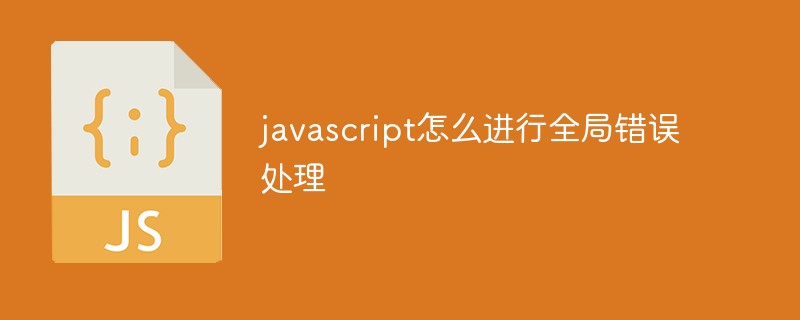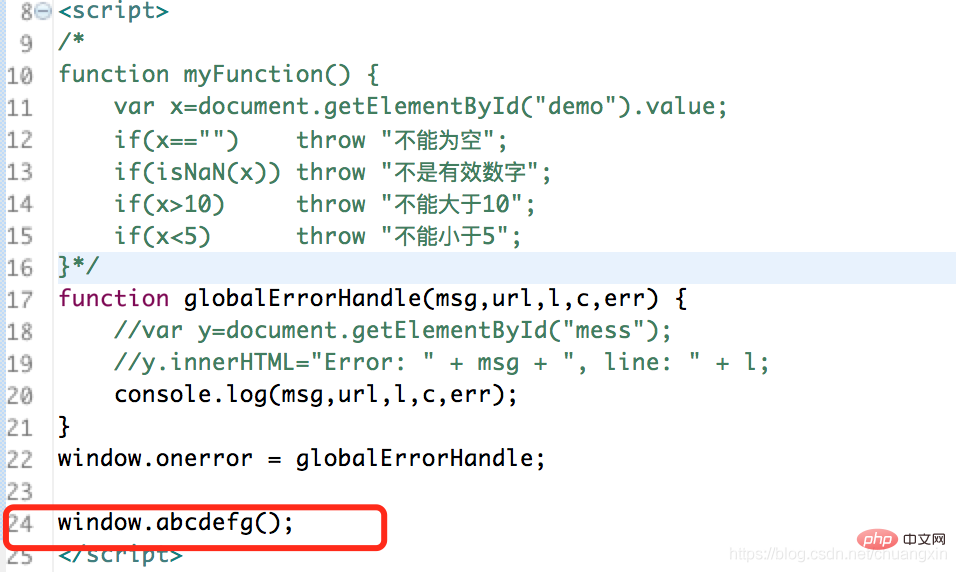In JavaScript, you can perform global error handling on the page by binding the "window.onerrot" event. The syntax format is "function function name (msg, url, l, c, error) {//code} window.onerror = function name;".

The operating environment of this tutorial: windows7 system, javascript version 1.8.5, Dell G3 computer.
When the JavaScript engine executes JavaScript code, various errors will occur: it may be grammatical or spelling errors, it may be browser differences (browser-specific functions are used), or the server may return an unhandled exception. Of course There are many other unpredictable factors. When an error occurs, the JavaScript engine interrupts subsequent code execution and generates an error message. In order to make the code more robust and avoid unexpected code interruptions, we need to handle various exceptions.
1. Local error handling
Local error handling refers to error capture and processing where the code may go wrong, which requires programmers to perform hard coding. There are 4 JavaScript error handling related Statements:
1) try, catch statement, error capture statement
2) final statement, after error capture processing, return pre-execution statement
3) throw statement , error throw statement
Case 1:
try {
window.abcdefg();
} catch (e) {
alert('发生错误啦,错误信息为:' e.message);
} finally {//总是会被执行
alert('我都会执行!');
}Copy after login
Console output:
An error occurred, the error message is: window. abcdefg is not a function
I will execute the
finally statement after catch and before return.
Case 2
<!DOCTYPE html>
<html>
<head>
<meta http-equiv="Content-Type" content="text/html; charset=UTF-8">
<title>Throw Demo</title>
</head>
<body>
<script>
function myFunction()
{
try
{
var x=document.getElementById("demo").value;
if(x=="") throw "不能为空";
if(isNaN(x)) throw "不是有效数字";
if(x>10) throw "不能大于10";
if(x<5) throw "不能小于5";
} catch(err) {
var y=document.getElementById("mess");
y.innerHTML="Error: " + err + ".";
}
}
</script>
<p>请输入一个5到10的数字:</p>
<input id="demo" type="text">
<button type="button" onclick="myFunction()">Test Input</button>
<p id="mess"></p>
</body>
</html>Copy after login
The function of throw is to escape foreseeable or unforeseeable errors into user-recognizable errors.
[Recommended learning: javascript advanced tutorial]
2. Global error handling
Due to the different levels of front-end developers , The degree of code standardization varies, and not all JavaScript codes have error handling. Therefore, JavaScript code often terminates unexpectedly due to unforeseen exceptions during execution. For this reason, we need to globally capture error exceptions and promptly remind developers to modify the code. As long as the window.onerrot event is bound, the global js error error handling on the page can be performed. The code is as follows:
function globalErrorHandle(msg,url,l,c,error) {
console.error("global js error: ", msg, l);
// TODO other things.
}
window.onerror = globalErrorHandle;Copy after login
Bind the window.onerrot event, and the globalErrorHandle will be called when the js error is reported, where:
msg: Error message
url: Error page url
- ##l: Code error line number
c: Column number-
- error: Error object
Use case 1 above to capture the global error, the code is as follows:
 Console output:
Console output:

3. Error reporting module design
Global error handling cannot The blocking code terminates unexpectedly, which means that when an error is reported during js execution and there is no try-catch error handling, globalErrorHandle will be called, but the subsequent code will terminate unexpectedly and will not be executed. Therefore, global error handling is more about global error recording and reporting. Usually three things are done:
- globalErrorHandle, global error capture;
report error information to the server (error page, line number, column number, etc.) ;-
- When the administrator discovers the js error message on the server, he orders the relevant personnel to modify it;
Look at a case, the screenshot is as follows:
 The picture above is a simple js error reporting module, error viewing page, information includes: error source (which page), error description, line number, operating system browser, operator, operation time, etc.
The picture above is a simple js error reporting module, error viewing page, information includes: error source (which page), error description, line number, operating system browser, operator, operation time, etc.
There are several things to note:
1) Filtering of reported content
As shown in the picture above shows that many error messages are the same. If errors are continuously triggered in a large loop, error messages will continue to be sent to the server. Therefore, filter the error messages before sending them. The operation is as follows:
When the page is loaded, first obtain the error source error description hashcode deduplication list; - When capturing global errors, whether the generated error source error description hashcode already exists, if not, an error message will be reported;
-
2) What content to report
In order to reproduce the error, it is recommended to make the error message as detailed as possible, at least including:
Error Page url- Error description, error line number, column number, stack information
- Browser and operating system information
- Operation time, even operator, parameters
-
For more programming-related knowledge, please visit:
Programming Video! !
The above is the detailed content of How to handle global errors in javascript. For more information, please follow other related articles on the PHP Chinese website!
















 Console output:
Console output: 
 The picture above is a simple js error reporting module, error viewing page, information includes: error source (which page), error description, line number, operating system browser, operator, operation time, etc.
The picture above is a simple js error reporting module, error viewing page, information includes: error source (which page), error description, line number, operating system browser, operator, operation time, etc. 

















![[Web front-end] Node.js quick start](https://img.php.cn/upload/course/000/000/067/662b5d34ba7c0227.png)



